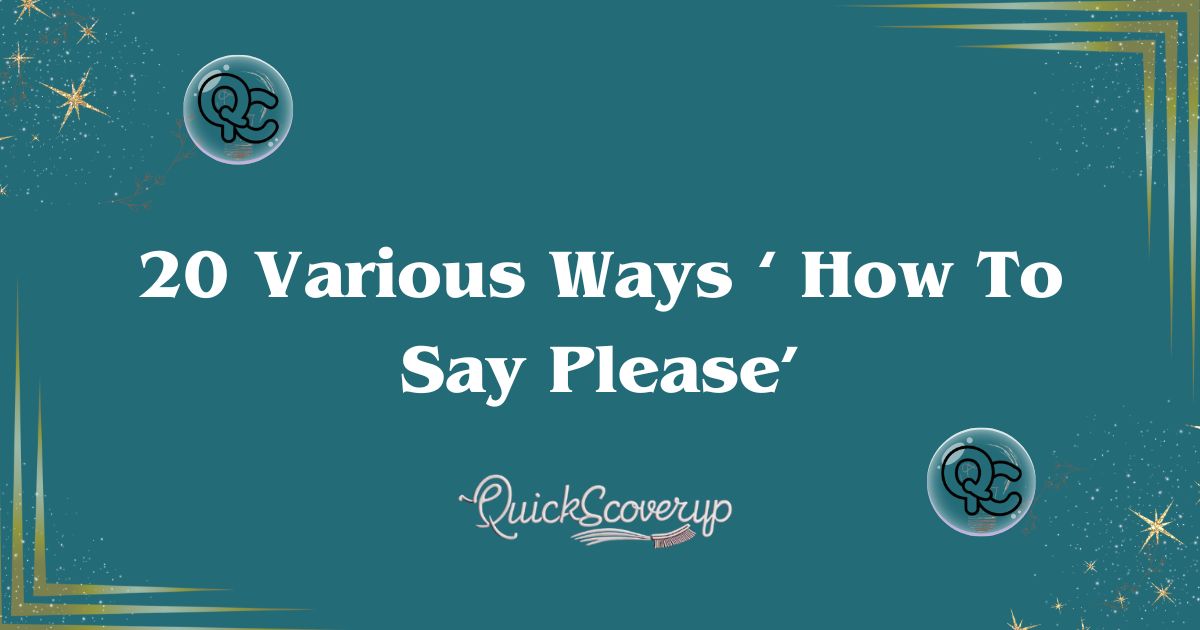Saying “please” is more than just a polite word; it reflects respect and consideration. You can use it when requesting help, asking for favors, or even when ordering food. By incorporating “please,” you show humility and acknowledge the other person’s time or effort. It softens your request and increases the likelihood of a positive response. This approach fosters better communication in both personal and professional setting.
You don’t always need to stick to the basic “please.” Phrases like “Would you mind helping me?” or “Could I ask a favor of you, please?” are thoughtful alternatives. These creative expressions can be used in formal emails, casual conversations, or negotiations, adding an extra layer of politeness. Using variations of “please” in different contexts shows emotional intelligence and a strong understanding of social dynamics.
Through this blog, we learn that “please” isn’t just about good manners but about effective communication. Whether in a work meeting, requesting something from a friend, or even asking for assistance in a store, saying “please” can improve interactions. It teaches us the power of softening demands and encourages cooperation. The blog shows how to use “please” creatively and thoughtfully in different situations to build positive relationships.
1. Could you…?
The phrase “Could you…?” is a gentle way to ask for help, blending courtesy with clarity. It’s perfect for professional emails when you need a task completed or in personal conversations to avoid sounding demanding. The open-ended nature of “Could you…?” makes it feel like a request rather than an order, fostering a collaborative tone. Whether you’re asking a colleague to review a document or requesting a friend’s assistance with a favor, this phrase keeps things respectful and polite.
Example Usage:
- “Could you send me the latest report by Friday?”
2. Would you mind…?
The phrase “Would you mind…?” is a gentle way of making a request or seeking permission, showing respect for the other person’s time and willingness. It’s perfect for situations where you want to be particularly considerate, whether in a professional email asking for feedback or in a personal context when requesting a favor from a friend. This phrase allows for a smooth conversation flow while giving the other party space to say no politely. It’s ideal for maintaining a courteous tone.
Example usage:
- “Would you mind reviewing this report before the meeting?”
3. May I…?
“May I…?” is a formal and respectful way to ask for permission, often used in both personal and professional environments. It’s especially helpful when you want to convey politeness, such as in meetings, emails, or when speaking with someone in authority. This phrase signals that you’re mindful of the other person’s time or boundaries. Its charm lies in how it shows humility while still expressing a clear intent. By using “May I…?”, you foster a courteous dialogue that respects the other person’s consent.
Example Usage:
- “May I take a moment of your time to discuss this proposal?”
- “May I borrow your book for a few days?”
4. Could I possibly…?
“Could I possibly…?” is a soft, polite way to ask for permission or a favor, making the request sound less demanding. It’s ideal for both professional and personal situations, such as requesting time off from work or asking a friend for a favor. The phrase emphasizes humility and respect, showing you’re aware the other person might say no. This makes it particularly useful when asking for something that might inconvenience the other party. By using “Could I possibly…?”, you make your requests feel more considerate and thoughtful.
Example Usage:
- “Could I possibly take the afternoon off to handle a personal matter?”
5. Would it be possible for you to…?
The phrase “Would it be possible for you to…?” is a courteous and formal way to ask for a favor or assistance, often used when you’re uncertain if the person has the time or ability to help. It’s perfect for professional settings, like sending a request to a manager or colleague, where you want to show respect for their schedule or workload. This phrase signals thoughtfulness and allows the other person to feel in control of their response. In personal situations, it can be used to ask for help without being demanding.
Example Usage:
- “Would it be possible for you to review my presentation by Friday?”
6. Is there any chance you could…?
The phrase “Is there any chance you could…?” is a softer and more considerate way to request something, particularly when you’re aware the request might be inconvenient. It’s perfect for both professional and personal settings, especially when asking for a favor that’s not urgent but would still be helpful. This phrasing shows respect for the other person’s time and allows them to politely refuse without feeling pressured. It’s ideal for situations where you don’t want to come off as too demanding.
Example Usage:
- “Is there any chance you could review this report by the end of the day?”
7. Do you think you could…?
The phrase “Do you think you could…?” adds a layer of consideration to a request, inviting the recipient to reflect on their ability or willingness to help. It’s especially effective in professional environments where respect for one’s time and capabilities is crucial, as well as in personal interactions where sensitivity is key. This approach acknowledges the other person’s autonomy and subtly encourages a positive response.
Example Usage:
“Do you think you could handle the presentation preparation this week?”
8. Would it be too much trouble to…?
The phrase “Would it be too much trouble to…?” adds a touch of humility and respect to requests, making it clear that you’re mindful of the other person’s time and effort. This expression is ideal for situations where you want to show consideration, whether you’re in a professional setting asking a colleague for extra work or in a personal context requesting a favor from a friend. It conveys a genuine appreciation for the other person’s willingness to help.
Example usage:
- “Would it be too much trouble to review this report by Friday?”
9. Could you possibly…?
“Could you possibly…?” adds an extra layer of politeness to requests, making it especially useful when approaching someone with a high level of formality or when you’re unsure of their availability. It conveys respect and consideration, suggesting that the request is not urgent and can be accommodated at their convenience. This phrase is ideal for professional emails, formal meetings, or when asking for a favor from someone you don’t know well.
Usage Example:
- In a formal request: “Could you possibly assist with the project planning this week?”
10. Would it be asking too much to…?
The phrase “Would it be asking too much to…?” is a gracious way to make a request while acknowledging the potential burden on the other person. It shows sensitivity and respect, making it ideal for situations where you’re concerned about overstepping boundaries, whether in a professional or personal context. Use it when you want to request something that might be seen as a big ask, allowing the other person to feel comfortable declining if necessary.
Usage Example:
- “Would it be asking too much to have the report finished by Friday, given your current workload
11. Can you…?
The phrase “Can you…?” is a direct yet friendly way to make requests, often used when you need something done promptly or when you want to be clear about your expectations. It’s ideal for both professional and personal contexts, from asking a coworker to complete a task to requesting assistance from a friend. This approach helps set clear boundaries and expectations, ensuring effective communication. In this blog, we explore how “Can you…?” facilitates straightforward conversations and avoids ambiguity.
Usage Examples:
- At work: “Can you send me the report by the end of the day?”
12. Could you do me a favor and…?
The phrase “Could you do me a favor and…?” is a nuanced way to request assistance that balances politeness with clarity. It’s ideal for both professional and personal interactions, as it conveys a sense of camaraderie and mutual support. Using this phrase shows respect for the other person’s time and effort, making it easier for them to agree to your request.
Usage Example:
- “Could you do me a favor and review this report before the meeting tomorrow? Your feedback would be invaluable.”
13. Would you be able to…?
“Would you be able to…?” is a polite, indirect way of making a request, often used in professional or semi-formal communication. It softens the ask, giving the recipient room to decline without pressure. This phrase is useful in situations where you want to maintain a courteous tone while ensuring the task is completed. It’s perfect for workplace emails or when asking for help in a personal setting without sounding too demanding. Using this phrase can enhance your emotional intelligence by showing consideration for the other person’s time and capacity.
Usage Example:
- “Would you be able to help me with this project over the weekend? It would mean a lot.”
14. Is it possible for you to…?
The phrase “Is it possible for you to…?” conveys a polite and formal request while acknowledging the other person’s potential constraints. It’s ideal for situations requiring a bit more tact, such as in professional emails or sensitive personal requests. This phrasing gently suggests the possibility of a task without assuming it’s feasible, allowing the recipient to respond comfortably.
Usage Example:
- “Is it possible for you to review this report by Friday?”
15. Could you kindly…?
The phrase “Could you kindly…?” adds an extra layer of politeness and respect to your requests, making it ideal for both professional and personal settings where you want to convey courtesy and appreciation. It is particularly useful in formal emails or during delicate conversations, where a touch of extra kindness can enhance the interaction. This phrase signals your awareness of the other person’s time and effort, fostering a more cooperative atmosphere.
Usage Example:
- In a professional email: “Could you kindly provide the updated report by the end of the day?”
16. Would you mind….?
The phrase “Would you mind…?” is a courteous way to request something while acknowledging that it might be inconvenient. It’s ideal for both professional and personal settings, as it demonstrates respect for the other person’s time and preferences. This approach invites a response that can lead to more open and considerate communication.
Usage Example:
- Professional Setting: “Would you mind reviewing this report before our meeting?”
17. Would it be possible..?
The phrase “Would it be possible…?” is a refined way to make a request, emphasizing the consideration of feasibility rather than simply demanding an action. It’s particularly effective in professional emails where you want to show respect for the other person’s time and constraints, or in personal situations when you seek a favor but don’t want to seem demanding. Using this phrase allows for a polite and thoughtful approach, making it easier for the recipient to respond favorably.
Example of usage:
- Professional setting: “Would it be possible for you to review this report by Friday?”
18. May I ask you to..?
“May I ask you to…?” is a polite and formal way to request someone’s help or permission in both professional and personal contexts. This phrase allows you to approach delicate situations with respect, showing that you value the other person’s time or opinion. It’s often used when asking for favors or seeking approval, as it creates a tone of mutual respect and consideration. By framing your request this way, you’re more likely to receive a positive response because it softens the demand, making the conversation feel collaborative. It’s ideal for use in business emails, meetings, or even personal requests.
Usage Example:
- “May I ask you to review the document before our meeting tomorrow?”
19. Whenever you get a chance
“Whenever you get a chance” is a flexible phrase often used in polite requests, allowing someone to address a task at their convenience without pressure. It shows understanding and patience while still subtly reminding the recipient. This phrase works well in both personal and professional settings, particularly when you don’t want to rush someone but still need their attention. It’s an excellent way to keep communication friendly and respectful while maintaining a balance between urgency and flexibility. Use it in follow-ups where timing isn’t critical, but the task is still important.
Usage example:
- “Hi Sarah, could you review the document whenever you get a chance? No rush, but I’d appreciate your feedback soon.”
20. If you could be so kind…?
“If you could be so kind…” is a polite phrase often used when making requests, softening the ask and showing respect. It’s great for formal or semi-formal communication where you want to maintain professionalism without sounding demanding. This phrase works well in emails, especially when you’re asking for a favor or clarification. Its warmth helps build a connection, as it emphasizes kindness and consideration, making it less likely to be met with resistance. Polite request phrases like this can make your message more approachable and human-centered.
Usage example:
- “If you could be so kind as to send over the revised document by Friday, I’d greatly appreciate it.”
Conclusion
Incorporating different ways to say “please” can significantly enhance your communication, making it more polite and engaging. Whether you use phrases like “would you mind”, “if you could”, or “kindly”, these alternatives add warmth and professionalism to your tone. Each variation helps you connect better with your audience, creating a more respectful interaction. By choosing words that fit the context, you not only soften requests but also improve the likelihood of a positive response. The key is to stay mindful of how different phrases impact the conversation and adapt them to suit your communication style.
FAQ’s
1. How can I say “please” politely in a formal email?
Use phrases like “I would greatly appreciate it if you could…” or “Could you kindly…” to add a touch of formality and politeness.
2. What’s a casual way to say “please” in a text message?
Simply adding “please” at the end of your request, such as “Can you send me the file, please?” keeps it friendly and straightforward.
3. How should I say “please” when asking for a favor from a friend?
You can use a warm and personal tone like, “Could you do me a favor and…?” to make your request sound genuine and considerate.
4. How do I use “please” in a professional setting?
In professional contexts, phrases like “Please let me know if you can…” or “I would be grateful if you could…” convey respect and courtesy.
5. Is it okay to use “please” multiple times in a request?
While it’s generally fine to use “please” more than once, ensure it doesn’t sound repetitive or overly insistent; balance it with polite language.











